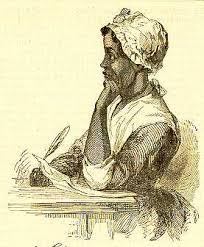|
Born in the Senegal or Gambia area on the West coast of Africa in 1753 Phillis Wheatley was captured by slave traders at the age of seven, and her life would never be the same. She was brought to America and sold to the Wheatley plantation in Boston, Massachusetts 1761; consequently she was given the name Phillis after the ship that brought her to the U.S. Phillis was the personal servant to Mr. Wheatley’s wife but unlike the ordinary slave she was educated by the Wheatley’s. Specifically Mary Wheatley the daughter of Mr. Wheatley taught Phillis how to read and write in English shortly after she was reading the Bible and writing poetry. She studied the poetry of Alexander Pope and also learned Latin, French, Astronomy and biology. Her academic success was unthinkable for a slave girl and even uncommon for a young white boy. Because she was so eloquent in her words she was used as the Wheatley’s entertainment when they would have guest in their home. She was often isolated from the other slaves on the plantation, she was given some privilege but was always reminded that she was a slave. Phillis was a young black slave girl living in a white world where she was intellectually superior to her white counterparts but she could never show it. Around the age of thirteen or fourteen Phillis published her first poem which debuted in the Newport Mercury News Paper. With the help of the English Countess of Huntingdon Phillis was able to publish her first book of poems titled, Poems on Various Subjects, Religious and Moral. Her publication made her the first African-American slave and African-American women to publish a book of poems. Phillis’ poetic style was a mixture of elegaic poetry and short epic style, it was also influenced by Alexander Pope and Thomas Gray. In 1775 Phillis Wheatley became a household name in the U.S. ad England when she wrote a poem praising George Washington and his leadership abilities. A year later when Washington was President of the United States Phillis accepted an invitation to visit the President in Cambridge, Massachusetts. Phillis showed her admiration for Washington through her writings, but she still felt that slavery was inhumane and unnecessary. She would travel to London, England as a way to help promote her poems since she was able to grow a following in England. While working in London Phillis would receive medical treatment for medical issues she battled for a while. Upon returning home in 1778 Phillis would learn that her master John Wheatley died along with his wife and she was no longer a slave. Later in 1778 she would marry John Peters and the couple would fight adversity throughout their marriage. All three of their children died at birth and Phillis found it difficult to find a publisher for her writings. She would work as a maid in a boarding house as she and her husband worked to survive their impoverished conditions. December 5, 1784 Phillis died helping to set the literary foundation future African-American for writers, men and women. Phillis was able to accomplish most of her literary feats as a slave girl, even though she gained her freedom race once again made life difficult for her. She capitalized upon an opportunity to learn and she managed to make history in doing so. During a time where the average black person in America was killed for wanting to learn to read, Phillis Wheatley was breaking literary barriers and making the world take notice. She is an inspiration to black writers around the globe, young and old. Miss. Phillis Wheatley we proudly stand on your shoulders. J.A. Ward. References:
https://www.nwhm.org/education-resources/biography/biographies/phillis-wheatley/ http://www.vcu.edu/engweb/webtexts/Wheatley/philbio.htm http://www.biography.com/people/phillis-wheatley-9528784#later-life
0 Comments
Leave a Reply. |
Details
Categories
All
Click Here to join our mailing list
|
Contact Us: |
Connect With Us |
Site powered by PIT Web Design


 RSS Feed
RSS Feed



